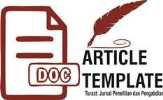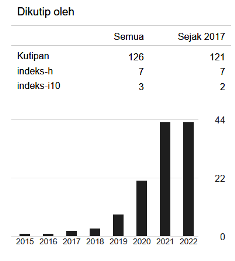Pendekatan Saintifik dalam Pendidikan Islam Menyongsong Era Revolusi 4.0
Abstract
This study aims to describe how a scientific approach in Islamic education in the 4.0 revolution era. This study is important because the era of the industrial revolution 4.0 is a phenomenon that collaborates with cyber technology and automation technology. The concept of the application is centered on the concept of automation by technology without using human labor in the application process. The essence of the 4.0 revolution demands the need for educative efforts to improve the quality of qualified and multicompetent human resources. For this reason, the implementation of a scientific approach to learning is an appropriate alternative. Regarding the scientific approach, Islamic education also has its own perspectives and strategies in facing the revolution era 4.0. Islamic education sourced from the Koran and Hadith always encourages the importance of learning through observation, asking, trying, processing, presenting, reasoning and creating in order to give birth to the quality of competitive human resources based on the values of faith and piety to Allah SWT. From the perspective of Islamic education, the implementation of a scientific approach that does not reduce the values of faith and piety will give birth to an optimistic quality of human resources and will always struggle to face every change by optimizing every potential it has. Thus, unwittingly the 4.0 revolution era will have an impact on the number of people losing their jobs and the quantity of unemployment will continue to increase given a large number of jobs that have been mechanically replaced by mechanical power.
Keywords
References
Fauzan, R. (2018). Karakteristik Model dan Analisa Peluang-Tantangan Industri 4.0. PHASTI, 4(01), 1–11.
Fitriani, Y., & Aziz, I. A. (2019). Literasi Era Revolusi Industri 4.0. Prosiding Seminar Nasional Bahasa Dan Sastra Indonesia (SENASBASA), 3.
Fitzpatrick, N., Burns, B., & Fay, B. (2011). Using Formative Feedback to Support a Blended Learning Programme.
Ghufron, G. (2018). Revolusi industri 4.0: tantangan, peluang, dan solusi bagi dunia pendidikan. Seminar Nasional Dan Diskusi Panel Multidisiplin Hasil Penelitian Dan Pengabdian Kepada Masyarakat 2018, 1.
Graham, C. R. (2006). Blended learning systems. The Handbook of Blended Learning, 3–21.
Hartanto, A. (2018). Making Indonesia 4.0. Jakarta: Ministry of Industry of the Republic of Indonesia.
Hidayatno, A., Destyanto, A. R., & Hulu, C. A. (2019). Industry 4.0 technology implementation impact to industrial sustainable energy in Indonesia: A model conceptualization. Energy Procedia, 156, 227–233.
Jamaluddin, M. (2001). Psikologi Anak dan Remaja Muslim. Jakarta, Ustaka Al Kautsar.
Kasali, R. (2018). Self Disruption. Jakarta: Mizan.
Keane, T. (2012). Leading with technology: 21st century skills= 3Rs+ 4Cs. Australian Educational Leader, 34(2), 44.
Kivunja, C. (2015). Exploring the pedagogical meaning and implications of the 4Cs “super skills” for the 21st century through
Bruner’s 5E lenses of knowledge construction to improve pedagogies of the new learning paradigm. Creative Education, 6(02), 224.
Lalo, K. (2018). Menciptakan generasi milenial berkarakter dengan Pendidikan karakter guna menyongsong era globalisasi. Jurnal Ilmu Kepolisian, 12(2), 8.
Leksono, J. W. (2015). Pendekatan Saintifik pada Kurikulum 2013 untuk Meningkatkan Keterampilan Berpikir Kritis Siswa. Proceedingfptk, 437.
Levin-Goldberg, J. (2012). Teaching Generation TechX with the 4Cs: Using Technology to Integrate 21st Century Skills. Journal of Instructional Research, 1, 59–66.
Ma’arop, A. H., & Embi, M. A. (2016). Implementation of blended learning in higher learning institutions: A review of the literature. International Education Studies, 9(3), 41–52.
Morgan, P. J., Huang, B., & Trinh, L. Q. (2019). The need to promote digital financial literacy for the digital age. IN THE DIGITAL AGE.
Muhammad, D. M. (2010). Kecerdasan Emosi menurut al-Qur’an. Akbar Media.
Muhammad, M., & Nurdyansyah, N. (2015). Pendekatan Pembelajaran Saintifik. Nizamia Learning Center.
Mujahada, K. S. (2019). Memperkuat Eksistensi Pendidikan Islam dalam Menghadapi Era Revolusi Industri 4.0. SALIHA, 2(2), 38–48.
Praherdhiono, H., Setyosari, P., Degeng, I. N. S., Slamet, T. I., Surahman, E., Adi, E. P., Degeng, M. D. K., & Abidin, Z. (2019). Teori dan Implementasi Teknologi Pendidikan: Era Belajar Abad 21 dan Revolusi Industri 4.0. Seribu Bintang.
Prasetyo, B., & Trisyanti, U. (2018). Revolusi Industri 4.0 dan Tantangan Perubahan Sosial. IPTEK Journal of Proceedings Series, 5, 22–27.
Priatmoko, S. (2018). Memperkuat eksistensi pendidikan Islam di era 4.0. TA’LIM: Jurnal Studi Pendidikan Islam, 1(2), 221–239.
Quraish, S. (2013). Wawasan Al-Qur’an: Tafsir Tematik Atas Persoalan Berbagai Umat. Bandung: PT Mizan Pustaka.
---. (2002). Tafsir Al-Misbah. Jakarta: Lentera Hati, 1.
Rahmi, U., & Darmawan, D. (2018). Blog Folio in Blended Learning: A Development of Students’ Information Processing Skills in Digital Age. Al-Ta Lim Journal, 25(2), 128–134.
Rogers, E. M. (2015). Evolution: Diffusion of innovations.
Sasongko, R. N., & Sahono, B. (2016). Desain Inovasi Manajemen Sekolah. Jakarta: Shany Publisher.
Setiadi, I. (2016). Psikologi positif: Pendekatan saintifik menuju kebahagiaan. Gramedia Pustaka Utama.
Singh, H. (2003). Building effective blended learning programs. Educational Technology-Saddle Brook Then Englewood Cliffs NJ-, 43(6), 51–54.
Staker, H., & Horn, M. B. (2012). Classifying K-12 blended learning. Innosight Institute.
Sundari, C. (2019). Revolusi Industri 4.0 Merupakan Peluang Dan Tantangan Bisnis Bagi Generasi Milenial Di Indonesia. Prosiding Seminar Nasional Fakultas Ekonomi Untidar.
Suragangga, I. M. N. (2017). Mendidik lewat literasi untuk pendidikan berkualitas. Jurnal Penjaminan Mutu, 3(2), 154–163.
Syamsuar, S., & Reflianto, R. (2019). Pendidikan dan tantangan pembelajaran berbasis teknologi informasi di era revolusi industri 4.0. E-Tech: Jurnal Ilmiah Teknologi Pendidikan, 6(2).
Trinova, Z. (2013). Pembelajaran berbasis student-centered learning pada materi pendidikan agama islam. Al-Ta Lim Journal, 20(1), 324–335.
Wahono, H. T. T., & Effrisanti, Y. (2018). Literasi digital di era millenial. Journal Proceeding, 4(1).
Wibawa, S. (2018). Pendidikan dalam Era Revolusi Industri 4.0. Pustaka Setia. Bandung.
Wilson, D. A., Dondlinger, M. J., Parsons, J. L., & Niu, X. (2018). Exploratory Analysis of a Blended-learning Course Redesign for Developmental Writers. Community College Journal of Research and Practice, 42(1), 32–48.
Yahya, M. (2018). Era industri 4.0: Tantangan dan peluang perkembangan pendidikan kejuruan Indonesia. Pidato Pengukuhan Penerimaan Jabatan Professor Tetap Dalam Bidang Ilmu Pendidikan Kejuruan Fakultas Teknik Universitas Negeri Makassar, 14.
Yusnaini, Y., & Slamet, S. (2019). Era Revolusi Industri 4.0: Tantangan Dan peluang Dalam Upaya Meningkatkan Literasi Pendidikan. Prosiding Seminar Nasional Program Pascasarjana Universitas PGRI Palembang, 12.
Zed, M. (2004). Metode peneletian kepustakaan. Yayasan Obor Indonesia.
Zulfatmi, Z. (2016). Internalisasi Nilai Melalui Student Centered Learning (SCL) Approach. Jurnal MUDARRISUNA: Media Kajian Pendidikan Agama Islam, 6(2), 312–328.
Refbacks
- There are currently no refbacks.
Copyright (c) 2021 Turast : Jurnal Penelitian dan Pengabdian

This work is licensed under a Creative Commons Attribution-NonCommercial-ShareAlike 4.0 International License.

This work is licensed under a Creative Commons Attribution-ShareAlike 4.0 International License
Turast: Jurnal Penelitian dan Pengabdian
Lembaga Penelitian dan Pengabdian (LPPM), Gedung Rektorat Lantai I
Kampus III Universitas Islam Negeri Imam Bonjol Padang - All rights reserved
Email: turast@uinib.ac.id



